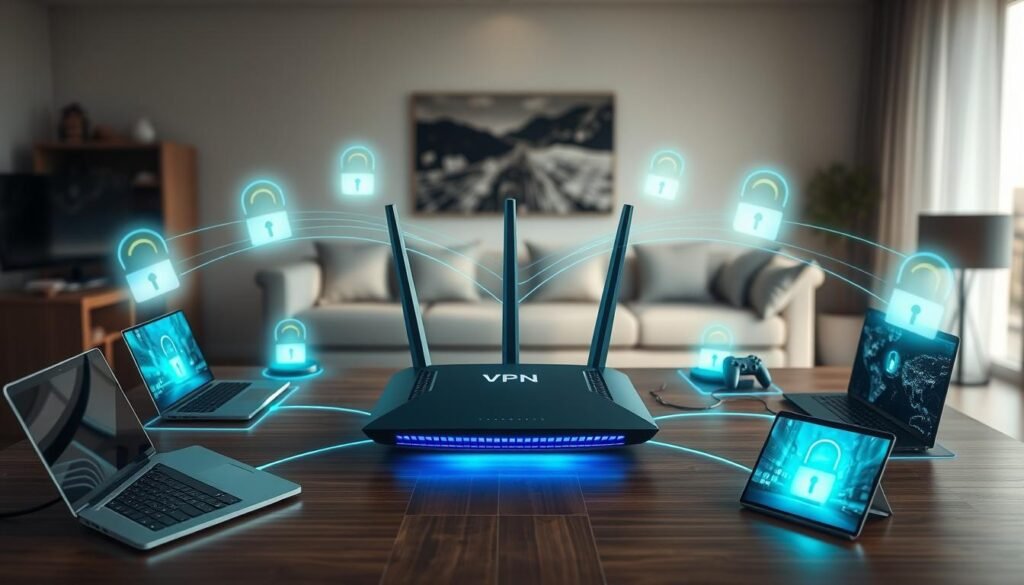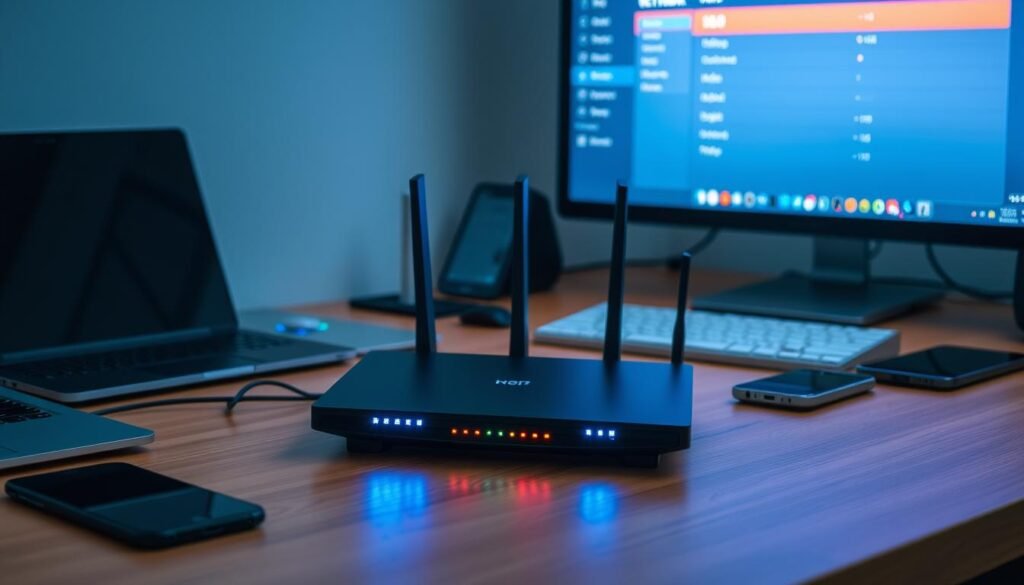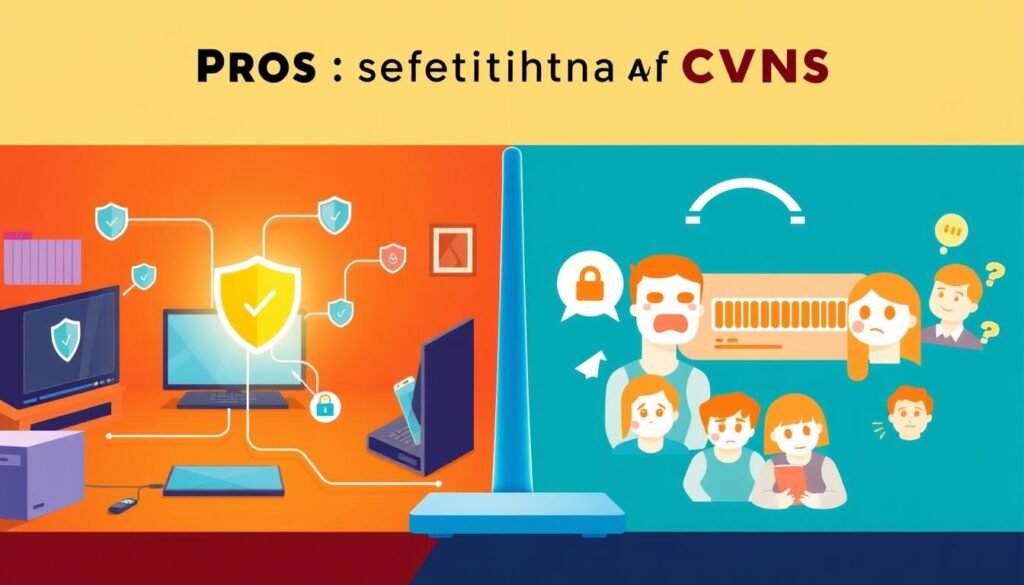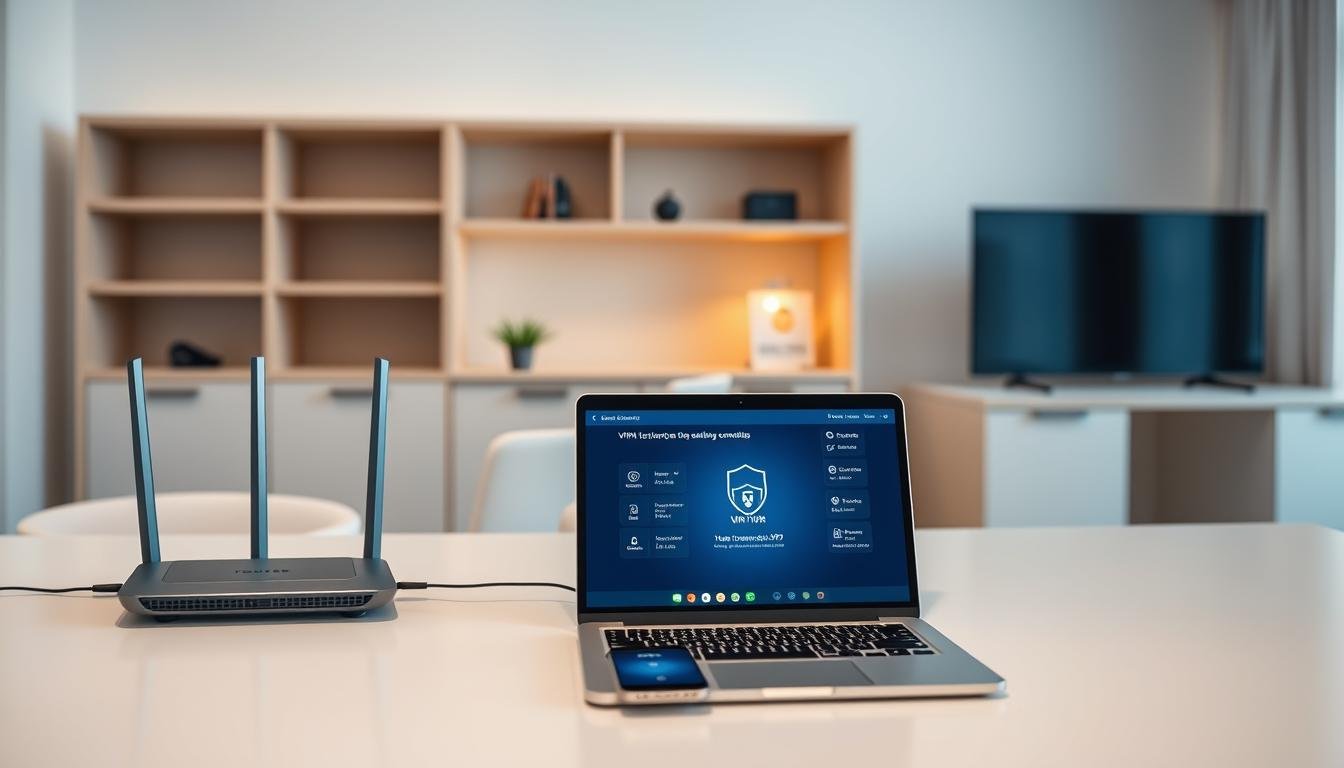Setting up a virtual private network (VPN) on your router is key to better online privacy and security. A secure VPN on your router encrypts your internet and protects all devices on your network. This includes smart TVs, gaming consoles, and IoT devices. In this guide, I’ll show you how to set up a VPN on your router and why it’s important for a safe digital space.
More of our lives are online, making a VPN crucial to keep our data safe. It’s especially useful if you have many devices needing internet. This way, you don’t have to secure each device separately. For more help, check out this VPN setup guide.
Key Takeaways
- Establishing a VPN on your router secures all connected devices.
- A VPN enhances privacy by encrypting internet traffic.
- Multiple devices can benefit from a single router VPN connection.
- Using a VPN on your router minimizes the need for individual device setups.
- Security is critical as online activities increase daily.
- They are easy to set up with the right instructions and provider.
What is a VPN and Why Use One on Your Router?
A Virtual Private Network (VPN) is a key tool for keeping your internet use safe. It makes a private link over public Wi-Fi, hiding your IP address and keeping your data safe. This is especially important in today’s world where online privacy is often at risk.
Setting up a VPN on your router brings many benefits. It not only protects your devices but also keeps all connected devices safe. The benefits of VPN on router include getting past online blocks, letting you see content not available in your area.
VPNs use strong encryption to keep your data safe on public networks. They hide your browsing history, IP address, and location, boosting your privacy. They also protect your data from ISPs and hackers.
The best part of a router VPN connection is that you don’t need to install software on each device. Once the VPN is set up on the router, all devices connected get the same security. This keeps your whole network safe.
In today’s digital world, VPNs are more important than ever. They keep your online activities private and let you access more content. Learning about VPNs is the first step to using the internet smarter.
| Feature | Description |
|---|---|
| Privacy Protection | Masks IP address and hides browsing activity. |
| Device Coverage | Secures all devices connected to the router. |
| Data Encryption | Utilizes protocols such as IPSec and SSL for secure communications. |
| Access to Content | Bypasses geographic restrictions on streaming services. |
| Enhanced Security | Protects against threats from public Wi-Fi networks. |
How a VPN Router Works
It’s key to know how a VPN router works for better online security. A VPN router acts as a shared VPN client. It lets many devices connected to it use an encrypted tunnel for their internet. This makes all data sent over the network safer and more private.

The router starts by linking to a VPN server using OpenVPN or PPTP. It uses strong encryption like AES 128-bit and 256-bit. This keeps your data safe from hackers. With a VPN router, you don’t have to install VPN software on each device. All devices connected to the router get the VPN protection automatically.
However, using a VPN router might slow down your internet a bit. This is because encryption takes some extra time. Different routers work differently with VPNs, depending on their hardware and software. Getting a good VPN-ready router can really improve your online experience.
One big plus of using a VPN router is the ease of managing it. You only need to set up one VPN connection, not for each device. This also helps you get around content blocks in different places.
In the end, knowing how a VPN router works is crucial. It helps keep your network safe and fast in today’s digital world.
How to Set Up a Virtual Private Network (VPN) on Your Router: Secure All Your Devices
Setting up a VPN on your router is a big step. It’s important to prepare well and choose the right VPN provider. This ensures a smooth experience.
Steps for Initial Preparation
Before you start with VPN setup, take these key steps:
- Check your router’s specs to see if it supports VPN client software.
- Make sure you have the download links for your operating system.
- For Windows, get the right version, 32-bit or 64-bit, or the default. For macOS, there’s usually just one download link.
- Be ready to fix any setup problems that might come up. Wrong installation can damage your router.
Choosing the Right VPN Provider
Choosing the right VPN provider is crucial. When picking, consider these factors:
- Privacy Protection: Look for a VPN that values user privacy.
- Encryption Standards: Choose a VPN with strong security, like OpenVPN or IKEv2.
- Customer Support: A good VPN should have great support for any setup or use issues.
- Server Locations: Pick a VPN with many server locations for fast connections. For example, Proton VPN has servers in over 60 countries, and Planet VPN offers strong encryption and a money-back guarantee.
How to Determine if Your Router is VPN Compatible
It’s important to know if your router supports VPNs for network security. Checking if your router is VPN compatible helps keep all devices safe and secure. Start by looking at your router’s specs and finding key features that show VPN support.
Checking Router Specifications
First, check your router’s specs to see if it supports VPNs. Look for these things:
- VPN Client Feature: Make sure the router manual or product description says it supports VPN clients.
- Supported Protocols: Check if it supports OpenVPN or IKEv2. These are key for a secure VPN connection.
- Firmware Options: See if your router can be updated with new firmware. Some routers can be flashed with DD-WRT or OpenWRT, boosting VPN features.
Common Router Brands that Support VPNs
Some router brands are known for great VPN support. Knowing these brands can help you find the right one. Here are some popular ones:
- Linksys, especially the Linksys WRT 3200 ACM model.
- ASUS, known for models like the ASUS RT-AC86U.
- Netgear, which has many models that support VPNs.
For more details, check out this VPN setup guide. Picking the right router can really improve your network’s security and speed.
General Steps for VPN Setup on Your Router
Setting up a VPN on your router is easy and boosts your network’s security and privacy. By following these steps, all your devices will get VPN protection without needing apps for each one.
Accessing Router Settings
The first step is to access router settings for VPN. You’ll need your router’s IP address. You can find it in the manual or by checking your computer:
- Windows 10/11: Open Command Prompt and type `ipconfig. Look for the default gateway.
- macOS: Go to System Preferences > Network, select your network, and click Advanced. The router’s IP will be visible there.
Enter the IP address in a web browser to log into your router’s admin page. You might need your router login details, which are usually on the device or in the manual.
Installing VPN Configuration Files
Once logged in, find the VPN section. This part changes with different routers. If you have AsusWRT, Tomato, or DD-WRT, you’ll need files from your VPN provider. Make sure your VPN service supports router setups and offers the right files. Services like VeePN are known for their strong encryption.
Verifying Your VPN Connection
After setting up, check if your VPN is working right. Use websites like this guide to see if your IP address shows the VPN server. Also, do speed tests to check the connection quality. If speeds are slow, check your router settings or reach out to your VPN provider’s support.

| Step | Description | Notes |
|---|---|---|
| 1 | Access Router Settings | Use the router’s IP address via a web browser. |
| 2 | Locate VPN Configuration Tab | This varies by router brand and firmware. |
| 3 | Upload VPN Configuration Files | Ensure compatibility with the router. |
| 4 | Check VPN Connection | Verify IP address reflects the VPN server. |
| 5 | Troubleshoot Any Issues | Contact customer support if necessary. |
Pros and Cons of Router VPNs
Setting up a VPN on your router has its good and bad sides. These factors affect how well your network is protected and your overall experience. Knowing these points helps you decide if using a router VPN is right for you.
Advantages of Setting Up a VPN on Your Router
There are several benefits to using a VPN on your router:
- Network-wide protection: It keeps all devices on your network safe, even those without VPN support.
- Multiple devices covered: It lets all devices on your network use one VPN connection, unlike most VPNs.
- Ease of use: Once set up, all devices connect to the VPN automatically, saving you time.
- Bypass geographical restrictions: VPNs let you access content blocked by your location, great for streaming.
- Protection against ISP throttling: A VPN can stop your internet service provider from slowing down your speeds.
Potential Drawbacks to Consider
However, there are also some downsides to using a router VPN:
- Potentially slower speeds: Encryption and routing can make your internet slower, depending on your router and VPN.
- Complex setup process: Setting up a router VPN can be hard, especially if you’re not tech-savvy.
- Restrictions from VPN services: Some VPNs might not work well with routers, causing connection issues.
- Management challenges: Managing all devices on your network can be tricky with a router VPN.
- Compatibility problems: Some routers might not support certain VPN protocols, requiring updates or changes.

| Pros | Cons |
|---|---|
| Network-wide protection for all devices | Potentially slower internet speeds |
| Multiple devices covered with one connection | Complex setup process |
| Ease of use for connected devices | Restrictions from VPN providers |
| Bypass geographical restrictions | Management challenges for network settings |
| Protection against ISP throttling | Compatibility problems with hardware |
Handling Router Firmware for VPN Compatibility
Setting up a VPN on your router requires understanding the importance of firmware. The right firmware boosts security, makes setup easier, and improves performance. Custom firmware is often needed to use your VPN service’s full potential, offering features not available in standard firmware.
Flashing Your Router with Custom Firmware
Flashing your router with custom firmware like DD-WRT or Tomato unlocks advanced features. It optimizes your VPN performance. A flashed router supports more VPN protocols, making your connection more secure and flexible.
The process involves:
- Checking if your router is compatible with the firmware.
- Downloading the firmware from a trusted source.
- Backing up your router settings before making changes.
- Following instructions carefully to avoid risks like bricking your device.
Custom firmware lets your router use modern encryption, boosting your network’s security.
Choosing the Right Firmware for Your Needs
Picking the right custom firmware is key. Popular choices include:
| Firmware | Key Features | Supported Protocols |
|---|---|---|
| DD-WRT | Advanced settings, user-friendly interface, strong community support | OpenVPN, IKEv2, PPTP |
| Tomato | Great for speed optimization and monitoring bandwidth | OpenVPN, PPTP |
| OpenWRT | Highly customizable, ideal for advanced users | OpenVPN, IKEv2 |
The right firmware depends on your router and desired features. Always check guides for your router model, often provided by VPN services. For more help, see this resource for detailed router firmware customization tips.
Tips for Optimizing Your VPN Router Experience
To make my VPN router better, I focus on keeping speeds high and handling many devices well. It’s all about balancing the network to keep everyone connected smoothly. Here are some great tips to boost your VPN router’s performance.
Maintaining Network Performance
Keeping my network in top shape is key for a great VPN router experience. Here’s what I do:
- Static Public IP: Having a static public IP on the WAN interface keeps my VPN stable and avoids dynamic IP problems.
- Consistent Encryption Levels: Making sure all devices use the same encryption makes my VPN stronger.
- Appropriate SA Lifetimes: Setting Phase I SA Lifetime longer than Phase II keeps my VPN tunnel stable.
- Hash and Encryption Algorithms: Picking strong hash and encryption algorithms is vital for safe data in IPSec VPNs.
Managing Device Connections
Managing devices well helps use bandwidth better and avoids slowdowns. Here’s how I do it:
- Different LAN Subnets: Using different LAN IP subnets for VPNs between sites helps manage traffic and avoid conflicts.
- Monitor Connected Devices: Keeping an eye on devices lets me spot and control bandwidth-heavy apps that slow things down.
- VPN Router Selection: Choosing a reliable router like the Cisco RV34x series, which supports SSL VPNs, boosts performance.
- Third-Party VPN Apps: Using third-party VPN apps makes setup easier and quicker, allowing for fast changes when needed.
| Router Model | Supported VPN Types | Key Features |
|---|---|---|
| Cisco RV34x | SSL VPN (AnyConnect) | Reliable connectivity, Easy setup |
| RV160 / RV260 | OpenVPN | Remote access through browser-based SSL VPN |
By following these tips, I’ve greatly improved my network’s performance. It’s all about making my online experience better and more secure. Taking the time to optimize my VPN router has made a big difference in my daily online activities.
Conclusion
In this article, I’ve covered how to set up a VPN on a router. This setup is key for keeping your online activities safe and private. It protects all devices connected to your network, no matter where they are.
As more people work from home or on the go, having a good VPN is crucial. It ensures your data stays safe and secure.
Setting up a VPN on your router makes managing devices easier, especially for remote workers. It uses strong encryption to keep your data safe. This means you can work securely without always being physically connected.
There are many types of VPNs to choose from, like SSL and IPsec. You can pick the one that fits your skills and needs best. This makes your online experience better.
Investing time in setting up a VPN router makes your internet faster and more secure. It lets you explore the digital world with confidence. With businesses focusing more on data privacy, now is the perfect time to protect your online presence.
Using a VPN router will make your digital life safer and more connected. It’s a smart move for anyone serious about online security.






